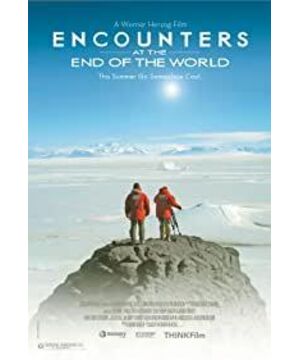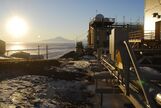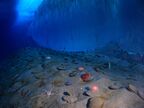I. Crazy penguin.
It’s been a long time since I watched the documentary. I made up this one today because I happened to see a blogger’s recommendation when I was browsing Weibo in the morning, and its recommendation was the penguin that appeared in the two-thirds of the film. In fact, I saw this screenshot on the Internet a long time ago, but I just found out today that it is from this documentary. This penguin has given me a lot of strength during some of my previous rather low times, as if seeing my own shadow in many segments of time. My sympathy for it cannot be expressed in words, it is a kind of spiritual resonance. I know that in other lonely stages in the future, this penguin will occasionally appear in my mind, giving me some self-deceiving comfort.
"It will inevitably die."
"Just to die."
II. The unfettered man.
The great feature of this documentary is that it focuses on expressing "people from the Antarctic", showing the common points of people of various occupations, backgrounds and experiences who came to Antarctica. The narrator also kept asking "Why?" about various things. I really saw too many memories of myself in the stories of these people. I remember that there was an old man who liked to watch (apocalyptic themed) science fiction films when he was a child, and clips from documentaries. It is also a black and white film about the extinction of mankind. People with such a worldview can only find their place when they come to a place as peaceful and mysterious as Antarctica, where there are also various challenges and things to be discovered. Including the woman who turned herself into a travel bag, stayed in Antarctica after the magical experience of traveling around, and the person in the screenshot who gave up his doctoral degree because it was contrary to the mainstream academic view of giving up on protecting endangered languages, only here To find "my people", even if you do some very ordinary things, but the mind is free.
III. Recognition of human agency.
Halfway through watching this documentary I wondered what exactly it would end with, and at the end there was this guy who appeared at the beginning quoting a passage from the poet. I think this passage is a powerful refutation of nihilism, showing the recognition of human subjective initiative, although there is some idealism, but under the whole previous foreshadowing, this passage is logically established as a binding. If the final ending is the opposite, such as "We understand the world with our eyes in the South Pole, listen to the harmony of the universe with our ears, and try to find the glory and splendor of the universe here - but the South Pole is always the South Pole, and the universe does not follow the way of human beings. Change your thoughts.” Such a sentence is inconsistent with the overall positive attitude shown before the end, and also goes against the main purpose of this documentary to show the stories of people in the Antarctic continent.
IV. Beneath the ice is another universe.
V. There are not many in this film, but the Antarctic scenery is still beautiful
View more about Encounters at the End of the World reviews







